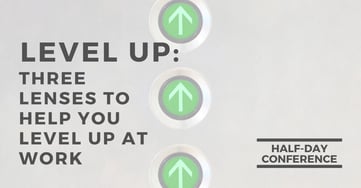Keeping Things Moving Forward
Anyone else noticing an abundance of absences these days? Seasonal bugs, caring for friends and family, extended work-from-home - we see a lot of this today, and the truth is, we've always had absences at work. While some responded to the eye-opening post-March 2020-world of what really matters by participating in the great resignation, others opted to stay and take more mental-health days, stay home-and not work-if they're sick, and be more willing to prioritize not-work over work instead of straining their home lives. For our balanced wellbeing, this is great! For our ability to get work done at work, this has introduced a whole new set of challenges.
How do we keep work going and getting projects done, when key folks who do the work or review the work or contribute to the decision-making of the work are, well, not there? Does that mean our project timelines, deadlines, deliverables, and results are all going to be pushed back seemingly indefinitely? That's not going to work. We've got to keep moving. So how do we do that?
Let me offer a couple of tips - not all of them can be done in the moment - some require advanced planning - but all can help keep things moving forward, and can help us get stuff done when folks are gone. You'll recognize some familiar phrases among these ideas, but maybe the nuance is just unique enough to stick!
Begin with the end in mind
Super obvious here, right? Before we embark on a trip, we should have at least an idea of where we're going and when we expect to arrive. If a group of us are going to embark on a project, initiative, or set of work, we all need to have a shared understanding of the end goal. By taking the time up front to plan out the goal, share a high-level picture of the roadmap, and agree on some key priorities for the initiative, any licensed driver can take the wheel along the way. If you haven't created your project one sheet or other similar overview of the scope, schedule, budget, priorities, team, and risk for your project, it's never too late to get one started! Likewise our teams should have operating guides that feature our purpose as a team and our major deliverables along the way. Learn more about this in our popular half-day class, Harnessing the Power of Your Team. Take a beat to create this overview, so that when someone steps out and others have to fill in, they know what matters. This is also super useful as a refresher when someone has been out, and they're getting caught back up.
Failing to plan is planning to fail
This gem has been around for a while, but that doesn't make it any less true. When we plan for the success of the work we have in front of us, we need to plan not just for the work itself, but also for how the work carries on when someone is away. This is a pretty foundational risk management technique.
-
-
If MJ is out for an extended time, then MJ's assigned work won't be completed, and so we're going to make sure that MJ has a backup, a delegate, a person who can at least limp along through their work in case of an extended absence.
- If Roseanne isn't here to make that decision, then we'll be delayed by waiting until she gets back, and so we're going to document the decision-making criteria that we can follow in her absence, or the escalation plan if it's stickier than we anticipate.
-
Shared spaces are better, shared.
IT departments everywhere have been advising us for years to store our files on the shared drives so they can be safely protected and backed up. The same goes here, too. When we're working on a project or initiative that involves people who do not occupy the same living and working space you do, then we've got to pause and create shared spaces to store project artifacts, decision documents, tools we can both use, the latest status updates, etc. If I save my work to my desktop or keep it in a paper notebook, then no one else can get it if I need to be out for a bit. Even if we think we won't need it, or we'll have to move physical documents or physical supplies or assets in case of extended absence, we should at least have a plan for how that's going to happen, so that when we need it, we just step right up and do it.
Communication is the deliverable until you deliver the deliverable
Nods, mad props, and lots of credit to John Stenbeck who coined this one sentence phrase to live by. Especially if there's increased cross-team or cross-functional or cross-organizational collaboration, then we've got to get more diligent about communicating how far we've gotten on the thing that we're working towards. If we’re going to get through this together (or without some of us), we need to know how far we got before the interruption, what's still left to do, and who's on point to get it done. That doesn't happen without an intentional commitment to effective communication.
If they don’t offer, ask; if they don’t ask, offer
Knowing how absolutely critical item 4 is above, this is like the failsafe for that. Since the only way for any of us to know what's going on in someone else's mind is to ask, we have to increase our skills and habits at asking. If you're leading team members on an initiative of some sort, it may feel less micromanage-y to leave them alone - just let them do it and let them share updates when they're ready. The problem with this is that if they go out of the office before they get ready to share their update, then you have no way of knowing how far they got. Easily, much of what we're doing at work isn't as important to that individual as their parent's failing health or caring for their kid who had surgery - but if we've neglected to stay current, we will have to choose whether we want to bug them to get caught up or just wait until "it's a better time to ask". At the end of each day - especially on time-critical stuff, ask them how far they’ve gotten. If you're working for someone else, offer your own update, even if they haven’t asked - this way everyone knows how far we got, and where we have to pick up.
End with the beginning in mind
Remember all those folks on day 1? Close the loop. Especially with increased and extended absences, we've got people who started one initiative, but may not be there to see it to completion. If they're still in your organization, just temporarily unavailable, make an intentional effort to close the loop with them to make sure that they're aware of how things landed at the end. They were part of the launching of this particular effort, and learning how it landed will do a couple of things. First, there may be some ongoing process impacts that the person will need to know because they impact their work in a way they weren't expecting before their absence. Second, there may be some lessons learned that are valuable to them. And third, perhaps my favorite, knowing that another human cared about them enough to catch them back up at the end helps that person know you value them.
So how about you? What would you add?









